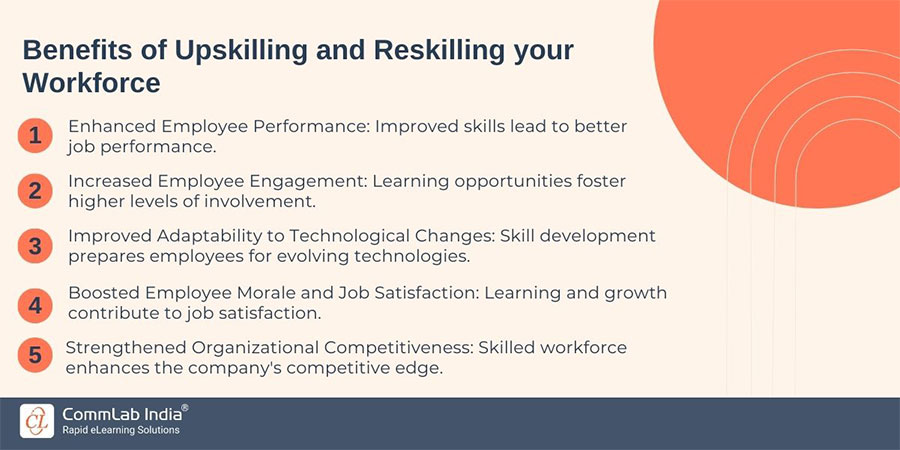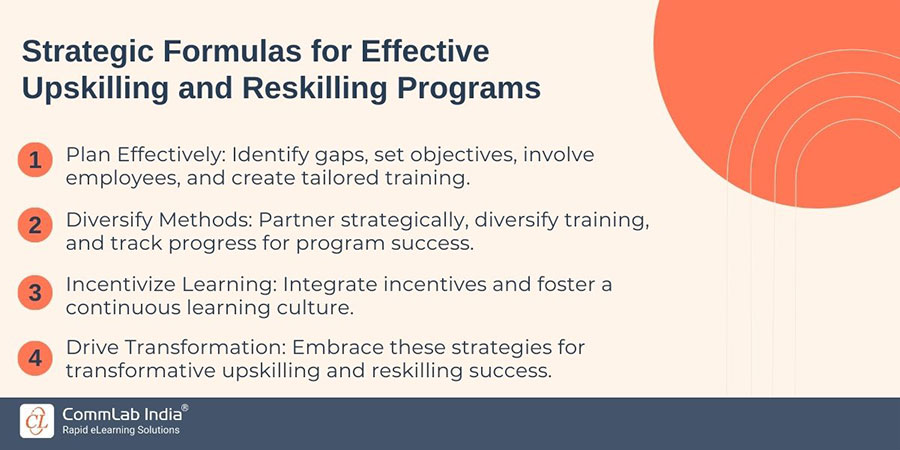How Can Upskilling & Reskilling Solve Business Problems? [ANSWERED]
![How Can Upskilling & Reskilling Solve Business Problems? [ANSWERED] How Can Upskilling & Reskilling Solve Business Problems? [ANSWERED]](https://blog.commlabindia.com/hubfs/blogs/upskilling-reskilling-strategies-corporate-training.jpg)
Do you wish to level up your business game? In today's rapidly evolving workforce, staying ahead of the curve is crucial to not only surviving but thriving. That's where upskilling and reskilling your employees come in. By investing in their growth and development, you can bridge the gap between current challenges and future success. In this blog post, we'll explore why upskilling and reskilling have become indispensable strategies for businesses looking to stay competitive, tackle new opportunities, and unlock untapped potential. Get ready to discover how closing the gap can open doors to a brighter future for both your company and its employees!
Empowering the Future Workforce through Upskilling and Reskilling
In an era of rapid change, upskilling refines existing skills, enhancing job performance, while reskilling equips employees with entirely new skills, preparing them for diverse roles. Together, they form the cornerstone of a dynamic workforce, ready to navigate the evolving landscapes of modern business.
Understanding Upskilling vs. Reskilling
In the context of employee training, the terms upskilling and reskilling often interchanged. However, the concepts are different and understanding their distinctiveness is very important for businesses aiming to close skill gaps efficiently.
Upskilling: Upskilling zeroes in on refining or adding to an employee's existing skill set, honing expertise within their current role. Think tailored training, resource infusion, and opportunities for mastering new techniques aligned with their position.
Reskilling: Reskilling ventures into uncharted territory. It involves equipping employees with entirely new skills, preparing them for diverse roles within the organization. This broader approach anticipates future challenges and positions the workforce as a dynamic entity.

The synergy of upskilling and reskilling is vital for addressing business challenges, adapting to industry shifts, and navigating technological advancements. Investing in these initiatives fosters a motivated, engaged workforce, resulting in elevated job satisfaction and retention rates.
Let us discuss how upskilling and reskilling strategies serve as dynamic solutions to address and overcome various business challenges.
Navigating Business Challenges with Upskilling and Reskilling
1. Digital Transformation
Technology's relentless evolution poses challenges in keeping pace. Upskilling in data analysis, coding, and social media marketing equips employees to leverage technology effectively, ensuring businesses stay competitive. By providing employees with these essential skills, companies empower their workforce to harness technology efficiently, ultimately ensuring sustained competitiveness in the ever-changing digital landscape.
For instance, a retail company implementing upskilling in data analysis equips its employees to utilize customer data effectively for personalized marketing strategies, enhancing overall business performance.
2. Employee Retention
High turnover rates, a prevalent challenge cutting across industries, bring about associated costs, decreased productivity, and a loss of expertise, emphasizing the pressing need for a solution. The roots of this issue often intertwine with the absence of upskilling and reskilling opportunities.
When organizations overlook providing avenues for growth and development, employees seek alternatives, making it imperative for businesses to recognize the value of investing in continuous learning. By actively offering opportunities for upskilling and reskilling, companies not only demonstrate a commitment to employee growth but also foster engagement and job satisfaction. This strategic approach not only mitigates turnover but also carries substantial financial benefits, making it both a prudent and economically strategic initiative.
For example, a tech company implementing a reskilling program for its software developers not only enhances their skills but also retains top talent, reducing turnover and associated costs.
3. Resolving Inefficient Processes
Inefficient processes act as growth impediments, draining resources and hindering progress. Common culprits include outdated skills, poor problem-solving, and resistance to change. Upskilling and reskilling provide a dual-pronged solution by addressing individual skill gaps and fostering a culture of continuous improvement.
For instance, imagine a manufacturing company facing efficiency challenges due to outdated machinery operation skills. Upskilling programs ensure employees are well-versed in the latest technologies, improving overall process efficiency. Simultaneously, reskilling initiatives that promote critical thinking empower employees to identify and eliminate bottlenecks, resulting in a streamlined and more productive workflow.
This proactive approach, integrating both upskilling and reskilling, not only minimizes waste but propels businesses toward their objectives, as demonstrated by a company implementing these strategies to enhance its manufacturing processes and boost overall productivity.
→ Download Now: Online Learning for Corporate Training [eBook]
4. Overcoming Talent Shortage
In certain industries facing a shortage of skilled workers, a lack of qualified talent leads to a shift from hiring externally to investing in reskilling existing staff. This not only fosters loyalty among employees but also saves costs compared to traditional recruitment.
For instance, let's take a tech company struggling to find enough cybersecurity experts. Instead of relying solely on hiring from outside, the company adopts a reskilling program to enhance the skills of current employees in related roles. Additionally, using staff augmentation services helps bring in specialized skills temporarily to meet immediate needs. This combined approach effectively addresses talent shortages, ensuring a capable and flexible workforce for sustained success.
5. Addressing Changing Consumer Needs
Meeting the ever-changing demands of consumers requires a strategic approach, involving upskilling in areas such as customer service or design thinking. By investing in these skills, businesses can stay finely tuned to evolving market needs, ensuring they consistently meet and exceed customer expectations.
For example, consider a retail company experiencing a shift in consumer preferences towards sustainable products. To align with this change, the company initiates an upskilling program for its design and product development teams. This training enables them to incorporate eco-friendly practices into their processes, addressing the evolving preferences of environmentally-conscious consumers.
This proactive upskilling not only retains the existing customer base but also attracts new segments, showcasing the business's commitment to staying ahead in a dynamic market landscape.
Strategies for Seamless Implementation

1. Meticulous Planning: Identify skill gaps, set clear objectives, involve employees in decision-making, and develop customized training plans as foundational steps for effective upskilling and reskilling programs.
2. Diversified Training Methods: Form strategic partnerships, diversify training methods, and track progress to ensure the effectiveness of upskilling and reskilling initiatives.
3. Incentive Integration: Integrate incentives and foster a continuous learning culture to solidify the success of upskilling and reskilling programs.
4. Transformative Strategies: Embrace these strategies to unleash the transformative power of upskilling and reskilling, propelling your workforce towards continuous growth, adaptability, and success.
How to Effectively Upskill and Reskill your Workforce? [Watch Now}
Wrapping Up
Upskilling and reskilling are essential catalysts for transformative change, equipping employees to navigate present challenges and fortifying them for the uncertainties of the future. Recognizing them as strategic imperatives, businesses weaving these threads into their culture craft a resilient, agile, and future-ready workforce—a cornerstone for enduring success.
Empower your workforce for the future! Download our eBook: 'Online Learning for Corporate Training' now to discover how leveraging online education can supercharge your upskilling and reskilling initiatives, ensuring your team stays ahead in an ever-evolving business landscape.



![7 Ways to Upskill and Reskill the Manufacturing Workforce [Infographic]](https://blog.commlabindia.com/hubfs/blogs/manufacturing-sector-digital-upskilling-infographic%20.jpg)

